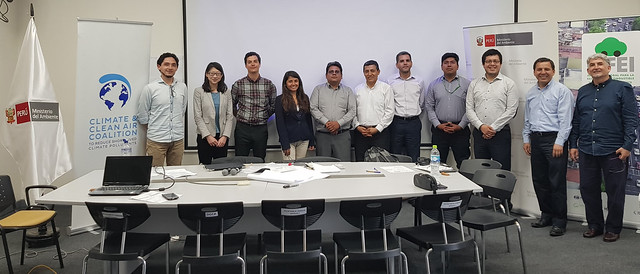Workshop
Peru workshop on fuel economy feebate system
On January 8-9, 2018, the Ministry of Environment of Peru held a workshop in Lima, Peru to discuss proposals for taxes and other incentives to promote cleaner and efficient vehicles in the country. Representatives of four Peruvian ministries —Environment, Energy, Transport, and Economy and Finance —participated.
The first day of the workshop focused on improving vehicle fuel efficiency through vehicle homologation (certification) on one hand and taxes, fees, and incentives on the other. The workshop was opened by Mr. Marcos Alegre Chang, the Vice Minister of Environmental Management at the Ministry of Environment. Mr. Luis Ibañez from the same department presented an overview of vehicle fleet development and fuel quality improvement at the national level. Mr. Ibañez highlighted that, although Peru imported many used vehicles in the past decades, from 2013, more than 99% of imported vehicles were new vehicles annually. Because all vehicles sold in Peru currently are imports, the government has opportunities to introduce new vehicles with advanced technologies quickly with appropriate policy support, such as setting fuel efficiency standards and providing tax incentives.
Mr. Paul Concha from the Ministry of Transport discussed the existing homologation process of vehicles in Peru and proposed a revised mechanism to enhance the process, including a documentation check, onsite examine, and laboratory testing. Gianni Lopez from Centro Mario Molina Chile suggested alternatives by which Peru could incorporate on-road emissions testing into its certification procedures for new vehicles.
Ms. Zifei Yang from the ICCT provided an overview of financial incentives and feebates, a system of fees and rebates, as tools to improve vehicle fuel efficiency for Peru. Ms. Miryam Yepes Salazar from the Ministry of Economy and Finance provided an overview of the existing vehicle and fuel taxation system in Peru and discussed the progress of on-going reforms, which incentivize use of natural gas, hybrid, and electric vehicles. Ms. Salazar also expressed a need to coordinate a potential feebate system across different agencies-for example, in order to maintain revenues from vehicle and fuel taxation.
The workshop provided a detailed technical training on using the feebate tool, developed by ICCT, the Global Fuel Economy Initiative, and the United Nations Environment Programme, to simulate the impact of customized feebate systems on fleet average fuel economy level, total CO2 emissions, and budget stream. Mr. Sebatian Galarza from Centro Mario Molina Chile and Ms. Zifei Yang lead the session for a small group of agency technical staff. Participants of the training learned the pros and cons of different options for various elements of a feebate, and were able to use the tool to customize their own hypothetical feebate systems for the Peruvian vehicle fleet.
The workshop identified the need for Peru to improve its homologation system and the opportunity to revise the existing vehicle taxation system to promote efficient vehicles and advanced technologies. The collaboration between four Peruvian government agencies shows the positive momentum behind promoting cleaner and efficient vehicles in Peru.


